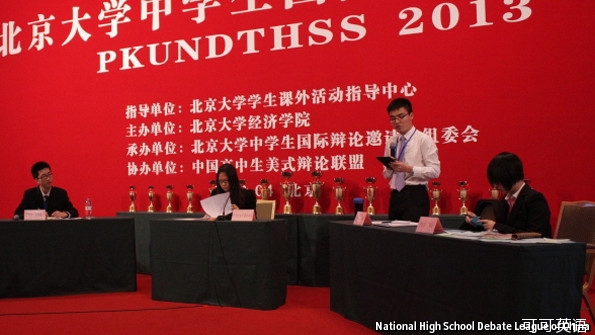Debating
辯論
This house believes
本方認為
Some schools are teaching children how to think for themselves
有些學校正在教孩子們如何獨立思考
Sep 14th 2013 | SHANGHAI |From the print edition

IN CHINESE classrooms, students rarely question teachers—part of a broader deference to authority in Chinese society. So the growth of Western-style debating in schools and universities, in which participants sometimes argue against prevailing Communist Party policies, can seem incongruous. But interest in such debates is growing.
在中國的課堂上,學生們很少質疑教師,這是中國社會尊重權利更廣泛的體現。因此,學校和大學里西式辯論的增多,有時會反對共產黨出臺的政策,顯得很不協調。但是對于此種辯論的興趣越來越高。
Many schools, especially in the big cities, have teams that debate, in English and Chinese. Educators say the aim is to develop some of the skills they know are lacking: critical thinking, spontaneity and public speaking. Many students also believe taking part in debating as an extra-curricular activity can help with applications to universities in the West.
許多學校,尤其是大城市里,有中英文辯論團隊。教育工作者說目的在于開發他們已知的中國學生所缺乏的技能,批判性思維,自發性和公開演講能力。許多學生也相信在課余時間參與辯論活動對他們申請西方大學有幫助。
Chinese universities have debating teams but there are more political sensitivities at higher levels of education so the debates tend to be less wide-ranging, says Gavin Newton-Tanzer, an American who founded the National High School Debate League of China. Last year more than 200 schools took part in the group’s tournaments. Top debaters from the organisation have been invited to compete at Harvard and Stanford universities in America.
創辦中國高中辯論聯盟的美國人Gavin Newton-Tanzer表示,中國大學有辯論隊,但是在更高等的教育中有更多的政治敏感性,因此辯論范圍稍小。去年超過200所學校參與了辯論聯盟的比賽。頂級辯手已經被邀請去參加美國哈佛和斯坦福大學的比賽。
The debates are chosen carefully. “We are culturally sensitive,” says Mr Newton-Tanzer euphemistically. A motion deemed too political might be rejected, and the students themselves have strong views. At a tournament in the central city of Wuhan, students refused to debate whether China should forgive Japan for its wartime atrocities, insisting that they could never forgive Japan.
論題是仔細挑選的。Newton-Tanzer委婉的說,我們對文化很敏感。政治性太強的辯題可能被拒絕,學生們觀點也很明確。在中部城市武漢的一次比賽中,學生們拒絕辯論中國是否應該原諒日本戰時的暴行,堅持表示他們永遠不會原諒日本。
Gao Wenbing is a member of a school debating team in the coastal city of Qingdao. He says he knows there are certain “red lines” he can never cross, such as mentioning some sensitive issues. “But basically,” he says in flawless English, “I feel quite free.”
高文冰是海濱城市青島的一名學校辯論隊成員。他說他知道有他無法逾越的紅線,比如說提及一些敏感話題。但是基本上我覺得很自由,他用流利的英語說到。
At one competition at Peking University, in which Mr Gao took part in May, students debated whether China’s rise is good for America or not. The debate went back and forth, with one participant, speaking for America, concluding: “we are the lighthouse of…liberty and democracy. Why do you think this ideology can’t prevail over the Chinese version of communist ideology?”
小高五月在北京大學參加的一次比賽中,學生們辯論中國的崛起對美國是利還是弊?辯論來來回回,有一個參與者為美國說話,總結到,我們是自由和民主的燈塔。為什么你們覺得這個思想無法戰勝共產主義意識形態的中國版呢?











